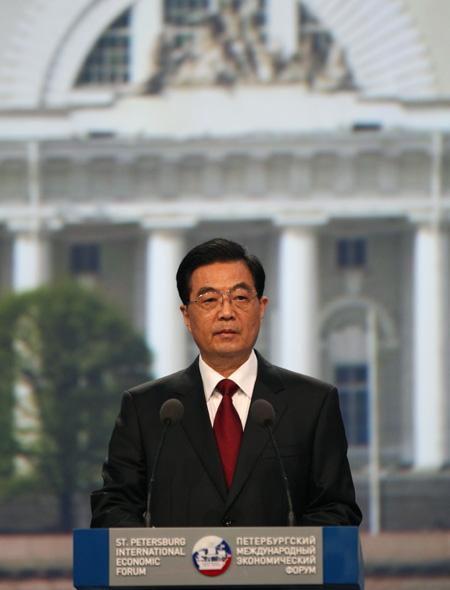
Chinese President Hu Jintao speaks at the International Economic Forum in St Petersburg, on Friday. [Photo/Agencies]
St Petersburg / Beijing - One of the chief symbols of the Russian state has long been a double-headed eagle, with one head representing the East and the other the West.
During recent centuries, though, Russia's ties to the West have taken on a greater importance than those with the East.
The rising economic power of Asian countries is changing that. Many economists say now is the time for Russia to turn more to the East, especially since the enormous economic growth seen in countries like China is expected to give rise to a huge demand for energy, which Russian companies will be well-positioned to meet.
"It's true that only about 20 percent of the Russian population is in Asia," said Oleg Deripaska, chairman of En+ Group, one of Russia's biggest energy conglomerates. "But we found it important to develop this region since it has an enormous demand for energy."
On June 16, the company signed an agreement with China Yangtze Power, a Chinese hydroelectricity producer, calling for the construction of a new power plant in Eastern Siberia.
"I think this will be very beneficial for both Russia and China," said Deripaska, noting that the company "will be more open to Asia".
About half of Russia's trade now is with European countries.
Its trade with China, meanwhile, accounts for about 10 percent of its total trade. China and Russia pledged on Thursday to increase the trade between themselves to a value of $200 billion a year by 2020, up from $55.4 billion in 2010.
"There is a great amount of demand in China, but the amount of trade occurring between China and Russia is still fairly small," said K.C. Chan, secretary for Financial Services and the Treasury of Hong Kong.
He called it reasonable for Russia to cooperate more with Asian countries, especially at a time when the economies of many European countries are not doing well.
According to official figures, the value of trade between Russia and China was $22.4 billion from January to April, up more than 30 percent from what it had been in the same period a year earlier.
Feng Yujun, head of the Institute of Russian Studies in the China Institutes of Contemporary International Relations, said China and Russia are tending to cooperate more.
"The Sino-Russian economic ties are of strategic significance and both the range and the depth of the mutual cooperation is unique for each partner," Feng said.
He offered some support for his statement: The value of trade between China and Russia, he noted, went from being $10.3 billion in 2001 to being $55.4 billion in 2010. That figure becomes even more remarkable, he said, when it is compared with the value of trade between Russia and the United States, which amounts to less than half of the number for China and Russia.
Pan Zhanlin, a specialist on Sino-Russian relations and a former Chinese ambassador to Yugoslavia, called Russia "an important collaborator of China's" and predicted the high-tech industry in particular will be "a future priority" in the cooperation between the two countries.
Discussing the possibility of an eastward shift in Russia's priorities, Feng said: "Russia has long been pursuing amicable ties with the West, but the great potential inherent in working with China speaks for itself.
"Russian Prime Minister Putin called on the EU to create a common economic space, but that led to more grand words than tangible achievements. China's solid financial condition and huge market, in contrast, are very attractive to Russia, which has benefited greatly from cooperating with China in the energy industry and other industries," he added.
Pan analyzed the change in Russia's priorities from a geographic perspective.
"Russia has a large area of land in Asia, which is relatively poorly developed," Pan said. "As a result, Russia, considering its interests in the Far East, must seek out cooperation from its Asian neighbors."
Wang Xing reported from St Petersburg and Wang Chenyan reported from Beijing.





